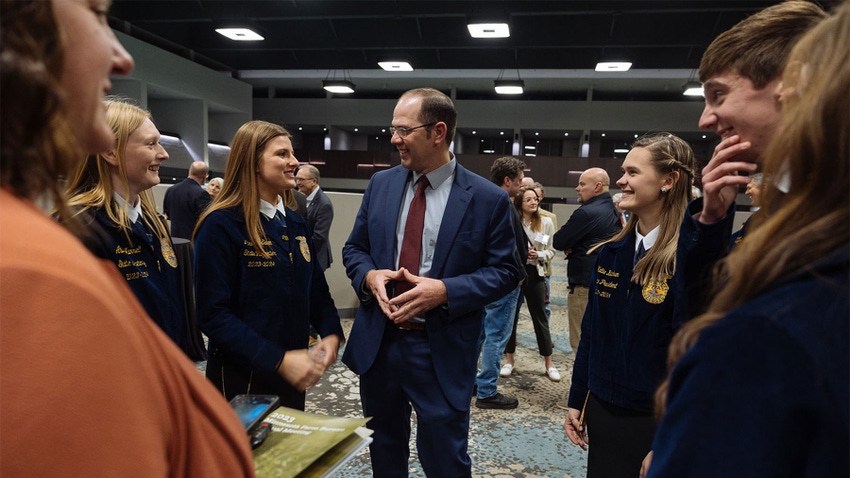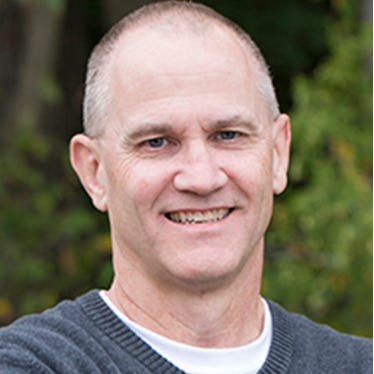
As a dairy and crop farmer, Dan Glessing knows the importance of looking ahead and not dwelling on the past.
The 2023 growing season is a good one to have in the rearview mirror, as he remembers three separate hailstorms that came to his Wright County acreage.
“A farmer has to be an eternal optimist, because if you aren’t you will not make it very long in our profession,” he says. “You think next year, it will be a great year. We’re going to get a timely rain — but not too much. We’ll have time to make our hay, and at some point, we’ll get the rain. You have to keep the faith for that long.”
In that frame of mind to look ahead, Glessing runs down the legislative priority issues set at the November annual meeting of the Minnesota Farm Bureau Federation. Glessing was reelected to his second two-year term as MFBF president.
Beginning and emerging farmers
“We expanded the definition of what we consider beginning and emerging farmers — because quite honestly, the average age of the farmer keeps going up, and with this capital-intensive business that we’re in, how do we get that new and younger farmer?” he says, adding that beginning farmers aren’t necessarily younger, “because we do have some coming into the industry when they’re in that middle age, who want something different, but really don’t know where to turn. … When we think of emerging farmers, urban agriculture also comes to mind.”
To target that, Minnesota Farm Bureau is hosting an urban ag conference on Jan. 13 on the St. Paul campus of the University of Minnesota. The one-day conference was made possible by a grant from USDA and will bring together a variety of speakers and resources to help attendees navigate some of the key issues they face.
Sustainability
Just as with emerging and beginning farmers, there is no single definition for sustainability.
“Certainly, new soil health practices that are coming online come to mind, and we can help promote grants that are both voluntary and incentive-based because when you’re trying new practices, you assume some risk, and how do we mitigate some of that risk?” he says. “That voluntary incentive basis is quite important to us. When talking about implementing more conservation practices, every farm is different, and you have to know what works for you.”
The Glessing dairy farm also produces dairy steers as well as alfalfa, corn and soybeans.
Glessing also stresses that renewable fuels fall under the sustainability umbrella. “We could have the infrastructure to almost have it here tomorrow. … The biofuels that we’re producing are ready to go, and it’s a cleaner air choice.”
Rural vitality
This may be the broadest umbrella on the MFBF platform, as Glessing admits rural vitality can be tied to child care, workforce development, housing and health care. “Going even further into health care, it’s mental health,” he says. “Farmers are a proud crew, but how do we get ahead of that? We need to make sure that they know it’s OK not to be OK, and they need to address it before it’s too late.”
All the above issues are what Glessing says are needed to make rural communities strong, “so that families can grow and thrive.”
He admits that rural child care was not an issue he thought would be a Farm Bureau concern when he first joined the organization, but it is an important issue a lot of rural families face.
Research and investment
Farmers and agriculture in general have progressed over the years through people looking for better ways of doing things, and Glessing sees that continuing. “Out here in the countryside, I firmly believe that we’re at the brink of being able to think outside the box with different cropping systems, and that comes through research — whether that’s from private companies or universities,” he says. “A lot of engineering comes from a farm shop, and we continue to put emphasis on that research component, investing in projects that can benefit our productivity, soil health or farming practices.”
Energy and resource preservation
Glessing says Farm Bureau members embrace alternative energy, such as the renewable fuels as mentioned previously, “as well as wind and solar — but how do we balance that delicate line of making sure that those have a path forward, but that we don’t lose prime productive farmland,” he says. “How do we preserve the ability to produce food on that landscape, but also look at these new alternative energy sources?”
In addition to ethanol and biodiesel, Glessing says renewable aviation fuel really has the potential to be another value-added avenue for Minnesota farmers.
About the Author(s)
You May Also Like






